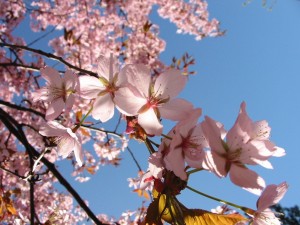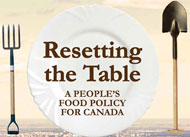Archive for April, 2011
It’s spring, right? And you want to know what’s in season in Ontario now.
Veggies:
Beets, cabbage, carrots, greenhouse cucumbers, greenhouse lettuce, mushrooms, onions, parsnips*, greenhouse peppers, rutabaga, sprouts, sweet potatoes and greenhouse tomatoes.
Fruits:
Apples and rhubarb.
According to Foodland Ontario, the above foods are “scheduled” for April. But with the slow spring we have this year, it might be better to expect them to arrive closer to May. All the same, it’s almost May so keep an eye out!
*Not a parsnip fan? Try this recipe given to me by my old CSA, La ferme de Bullion, in Québec. It’s surprising how eating a good-for-you, local food prepared in a new way can make you feel like a super star.
Parsnip Pancakes
4 cups parsnip peeled and cubed
2 eggs slightly beaten
1 onion finely chopped
1 tsp salt
1 tsp oil
1/2 cup finely chopped walnuts
1 tsp dried tarragon
2 cups breadcrumbs
Steam parsnips until tender (10-15 mins). Sauté onion in oil, add tarragon.
Mash parsnips; add onion, egg, salt and nuts and mix well. Form into 12 patties.
Coat with breadcrumbs. Bake at 350F for 20 minutes.
Mmm mm.
(Ontario garlic might make a good addition too.)
Canada now has a citizen-driven food policy.
The People’s Food Policy (PFP) was unveiled this past week as a plan that addresses some of this country’s most confounding food-related inconsistencies, including why close to 2.5 million Canadians don’t have enough to eat, while one in four of us is considered obese.*
What is new here is that the PFP looks at our food system and recognizes its inter-connectedness with issues of health, hunger, climate and agriculture. Food and agri are often associated, but to include health, hunger and climate in the picture is nothing short of revolutionary for this country.
I guess that’s what happens when regular citizens get involved. The PFP consulted regular Canadians, farmers, fishers and organizations that deal with food security.
What did the inquiry find? Basically that our food system is failing us, and the status quo is not an option, says Amanda Sheedy, PFP coordinator.
Key PFP recommendations:
- Localizing the system so that food is eaten as close as possible to where it is produced.
- Supporting food providers in a widespread shift to ecological production, including programs to support new farmers getting on the land.
- Enacting federal poverty elimination and prevention programs to ensure Canadians can better afford healthy food.
- Creating a nationally-funded children and food strategy.
- Ensuring that the public, is actively involved in decisions that affect the food system.
Here, here!
The new People’s Food Policy site just launched, so take a minute to sign their pledge for a healthy, fair and ecological food system.
*<rant>
Of course, this might be due the plethora of inexpensive, nutrient-poor, food-like products that pass for food on supermarket shelves that fill us up but leave us malnourished.
</rant>
Good news, urban farmers are getting busy, despite the unspring-like weather.
Check out the Toronto Star article about Erica Lemieux from City Seed Farms and get inspired.
I had the pleasure of chatting with Erica at a Food Forward event a few months ago. She’s a local girl who was inspired by BC spin farms and decided to make things grow in Toronto backyards.
Good news is that she’ll be a speaker at Food Forward’s next Foodie drinks event, May 5 at Stella.
Please check out a wonderful post on Folks gotta eat about a new grant by the McConnell Foundation to help strengthen regional food economies.
This is inspiring stuff. We need it, and we need more of it.
Ever heard of the Doomsday Vault?
The Svalbard Global Seed Vault is located on the remote island of Spitsbergen, Norway. It’s a backup should anything happen to seeds currently being saved in traditional genebanks — a type of safety net against loss of diversity.
Sounds like a good enough idea, right? If calamity strikes, be it natural or man-made, we have something to go to, a plan B.
But as Genevieve Grossenbacher of Seeds of Survival, mentioned at the 2011 Organic Grower’s Conference, who is going to have access to those seeds in an eventual disaster?
Will you? Not likely. Nor will I.
With the free exchange of seeds now being further threatened by Canada’s Comprehensive Economic Trade Agreement with the EU (more on CETA at the National Farmers Union), it’s high time we expand our love of local food to include local seeds.
Local seeds are adapted to the local environment. They have evolved over thousands of years to grow and flourish in a specific location with specific growing conditions. Local seeds produce the best, most resilient, most nutritious local food and are the best seeds to plant -– and to save.
It’s spring. Plant your herbs and your veggies, but plan to save a few seeds from your harvest for next year. All you need is an empty clean jar.
More info on seeds and seed saving:
Seeds of Diversity
Guelph Centre for Organic Farming
Urban Harvest


